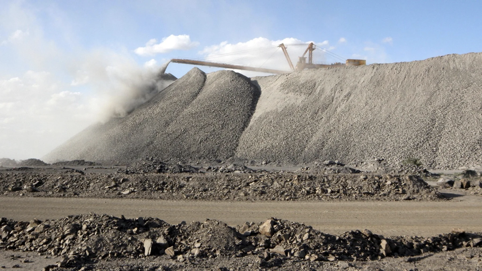China tightens rare-earth regulations, policing entire supply chain
China tightens rare-earth regulations, policing entire supply chain
Stricter export controls give Beijing leverage amid US tensions

A machine extracts rare-earth materials at the Bayan Obo mine in Inner Mongolia, China. © Reuters
SHUNSUKE TABETA, Nikkei staff writer
January 16, 2021 05:12 JST
BEIJING -- China will strengthen regulation over the rare-earth metals industry, from mining to exports, the Ministry of Industry and Information Technology said Friday, in what some see as its latest response to ongoing tensions with the U.S.
Whereas current regulations focus on the production stage -- such as mine development, smelting or separation -- the draft law of the new regulations seeks to manage the "entire industry chain" of the precious ore, including refining, product transport and all the way up to exports.
The rules state that companies are obligated to follow export control laws and regulations regarding the export and import of rare-earth minerals. This suggests that Beijing could apply its new export control law implemented in December, which strengthens state control over the flow of strategic materials.
The ministry said it has started to solicit public opinion on the draft rules. The rules are expected to be implemented as early as this year.
The new rules would give Beijing greater control over the supply of materials that have become vital for high-tech manufacturing around the world. China accounts for more than 60% of global rare-earth production, and its exports sank to a five-year low in 2020.
Soil containing rare earths is transported at a port in China's Jiangsu Province. © Reuters
As the U.S. moves to build a network of partners to hem in China on the tech front and elsewhere, "there are concerns that Chinese authorities will use these new rules to counter it," said an executive at a foreign company operating in Japan.
The draft regulations prohibit the purchase and sale of rare-earth products that are exploited and extracted illegally. An industry official says this is expected to help stabilize the market, as well as protect industrial security and the environment, reports the Xinhua News Agency.
A tracking system for rare-earth products will be established, enhancing "closed-loop management" of the industrial chain, the document noted.
Regulatory responsibilities, the project approval process and quota management are also covered by the 29-part draft, the ministry said.
Rare earths are essential for the powerful magnets found in electric-vehicle motors, among a variety of other applications, including drones and missiles. Japanese companies, for example, use Chinese rare earths to produce magnets for customers in the U.S. and elsewhere.
China considers rare earths a "strategic resource" that can be leveraged to its advantage in international diplomacy. It temporarily cut off rare-earth exports to Japan in 2010 when tensions rose over the Senkaku Islands, claimed by Beijing as the Diaoyu and administered by Japan.
As trade tensions escalated with the U.S., China threatened to suspend rare-earth exports in 2019. And Beijing made similar threats last year over American defense contractor Lockheed Martin's contract to upgrade air defense missiles in Taiwan.
The U.S., which relies on China for 80% of its rare-earth imports, and Australia are spearheading an initiative to create an alternate supply chain, despite challenges including ore quality and costs. Australian rare earths mining company Lynas and American partner Blue Line are building a Texas processing facility, which will handle such heavy rare earths such as dysprosium, used in magnets.
With a similar project abandoned in France, the Texas site is the only one of its kind without Chinese involvement, according to a Japanese industry analyst.
Japan is also seeking alternate supplies of rare earths, with an eye on lowering its reliance on Chinese imports from 58% to 50% or less by 2025.
- Last:Investors rush into semiconductor stocks amid global chip cr 2021/1/20
- Next:‘Bridges’ to Maximize Social Security Benefits Should Be Bui 2021/1/19
